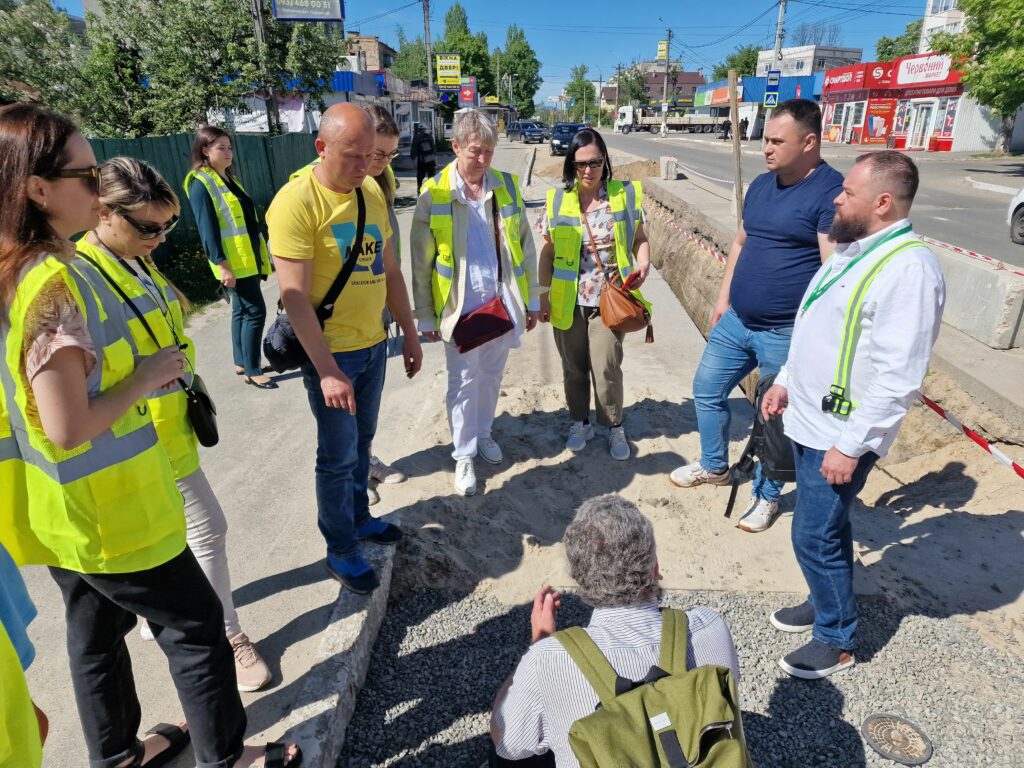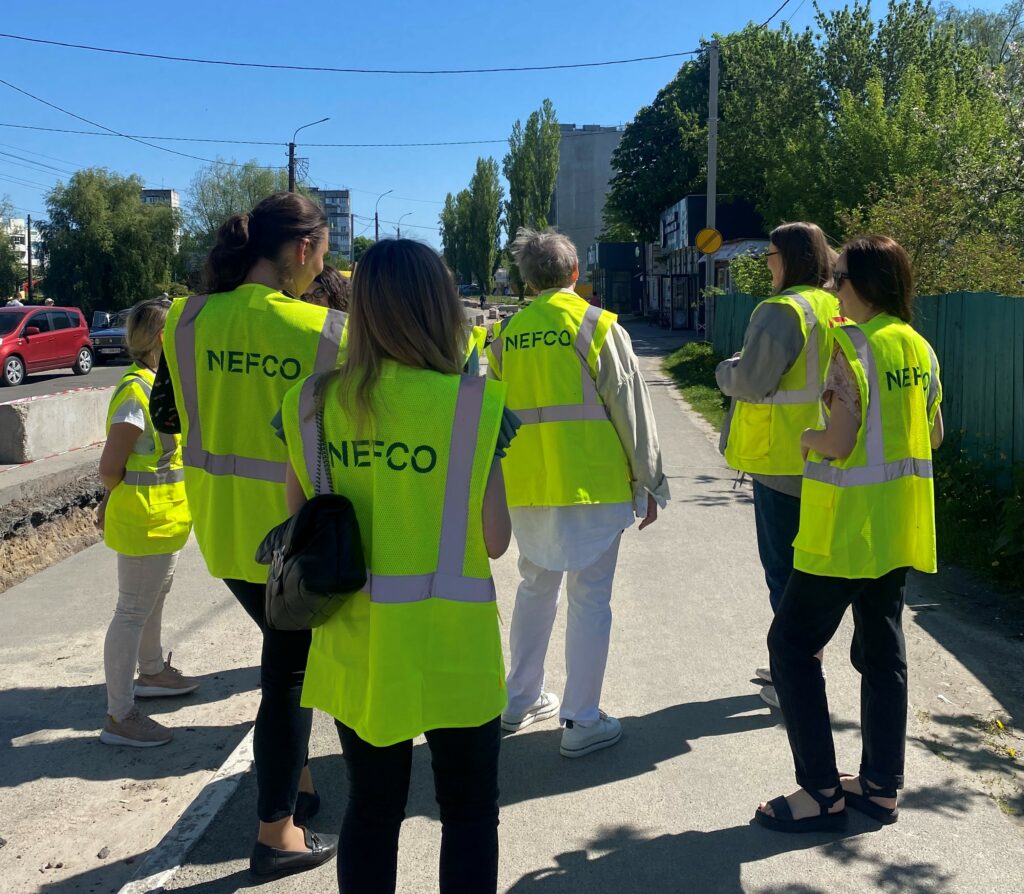13.05.2024 | People
Nefco has been operating in Ukraine for 20 years. The Russian invasion that began in 2022, however, has drastically altered the nature of Nefco’s work in the country. Nefco’s Eastern Europe team—comprising 18 individuals, eight of whom reside in Ukraine—now faces unprecedented challenges. Four local team members share their experiences amidst the ongoing conflict.
Before Russia’s invasion, some of the biggest challenges of working in Ukraine included issues such as corruption. Now, time has emerged as another complication, as projects have to be completed as quickly as possible.
Funds managed by Nefco will be used to support the reconstruction or modernisation of residential buildings for approximately around 45,000 internally displaced Ukrainians. At the same time, a district heating network must be rebuilt, and it is important to start the operations of water and sewage utilities. Additionally, daycare centres and schools are being repaired. Nefco is also in charge of maintaining and updating critical infrastructure.
“I’m really proud of what Nefco does. Our projects are important for both the environment and people. Moreover, compared to other international financial institutions, Nefco moves swiftly, although staying on schedule is sometimes challenging,” says Tetiana Lytvyn, Investment Specialist at Nefco’s office in Ukraine.

According to Andriy Katashov, Technical Adviser, factors complicating matters include a labour shortage. A large proportion of construction professionals are serving on the frontline of the war.
“The need defines which projects we take on. At the moment, internally displaced people and critical infrastructure are extremely important,” says Alexey Dumik, Technical Adviser. “You could say the Red Cross takes care of providing food and clothing for internal refugees, while Nefco covers housing.”
Some of the work is very demanding, says Dumik. Replacing boilers, or sewage treatment plants, or underground piping is an extremely difficult operation. By contrast, energy efficiency renovations in buildings are relatively easy.
“However, all solutions must be sustainable. That’s a fundamental principle for Nefco. Solutions must be long-lasting, energy-efficient and environmentally friendly. On the other hand, with extremely tight deadlines, all projects have to be done right the first time. Municipalities have no chance of continuing work even if there are faults. Everything must be done in one go,” Dumik says.
“One of Nefco’s key objectives is to make green projects,” says Tetiana Lytvyn. “A green transition is taking place, and we have to be involved and keep going in that direction despite everything. The companies helping and taking part in the reconstruction of Ukraine should also think green. It’s important for the environment, but from a Ukrainian point of view, it’s also related to integration with the EU. We must now build according to EU norms.”
Fostering transparency and competitiveness to tackle corruption
Andriy Katashov joined Nefco in 2007. In his role as Technical Adviser he is practically responsible for all the stages of a project – from proposal to implementation.
“During my career at Nefco, the nature of our work has changed a lot. We’ve become more like managers; we don’t go that deep into the details or documents of a project. We’re not as actively involved in hands-on work as we were at the beginning.”
However, Nefco has strict limitations and rules for the use and monitoring of the funds it manages. To prevent misconduct, Nefco has a procurement policy and related practices that are applied in all projects. Policies regarding integrity, ethics, and compliance enable Nefco to monitor partners, such as municipal representatives and contractors, and inspect their operations throughout the project cycle. Transparency and competitiveness are the cornerstones of Nefco’s principles, which are also meant to lower the risk of corruption.
Tetiana Lytvyn, whose work involves different project stages and tasks, finds her job as Investment Specialist multifaceted.
“I work closely with consultants and municipalities. Despite the standard procedures and rules that we follow, each project is unique and requires new competencies and creative approaches. It is necessary to understand different areas, including financial, legal, ethics and compliance since all project beneficiaries must be examined thoroughly: suspicions of corruption and criminal investigations.”

Lytvyn joined Nefco eight years ago. She had already worked closely with Nefco in the past in the municipal sector. She had become acquainted with Julia Shevchuk, Nefco’s Chief Investment Adviser, who is now leading the Representative Office in Ukraine remotely from Helsinki. It was easy for Shevchuk to take the decision to hire an expert with particular expertise in municipalities and energy efficiency projects.
“I was very glad to join the Nefco team. I think that my previous experience working in the municipality and energy efficiency projects played a crucial role when deciding to hire me.”
The war changed everything
Tetiana Vekha, Project Administrator, is in charge of administration in Nefco’s projects in Ukraine. She is a link between Nefco and its projects.
“I started at Nefco a year ago, and getting to know my new colleagues was a bit difficult,” Vekha recalls. “We all work remotely and rarely see each other offline. Another complication is that sometimes there is no electricity, and sometimes we need to go to the bomb shelter during the working day. It’s hard, but we have to adapt. My family and friends live close by, and that’s a huge mental resource for me. It is also very inspiring and motivating to see the real results of our work.”
There’s a special side to these projects:
Andriy Katashov
we can help real people.
When the war started, a real need for solutions enabling electricity generation emerged. Russia was relentless in its bombing of critical infrastructure and power plants.
“Ukraine is one of the first countries where the value of renewable energy solutions was truly recognised,” Dumik says. “The significance of solar panels, for example, is now understood completely.”
Tetiana Vekha has always known what Nefco is because she previously worked in the energy sector.
“I’m very proud of my work at Nefco. We are rebuilding our country, and making it greener and more sustainable,” Vekha says.
When Andriy Katashov started at Nefco, all projects were unique. It was very exciting, and Katashov was creating something new all the time. Now, the focus is on projects carried out with municipalities.
“It’s routine work, but there’s also a special side to these projects: we can help real people,” Katashov says.